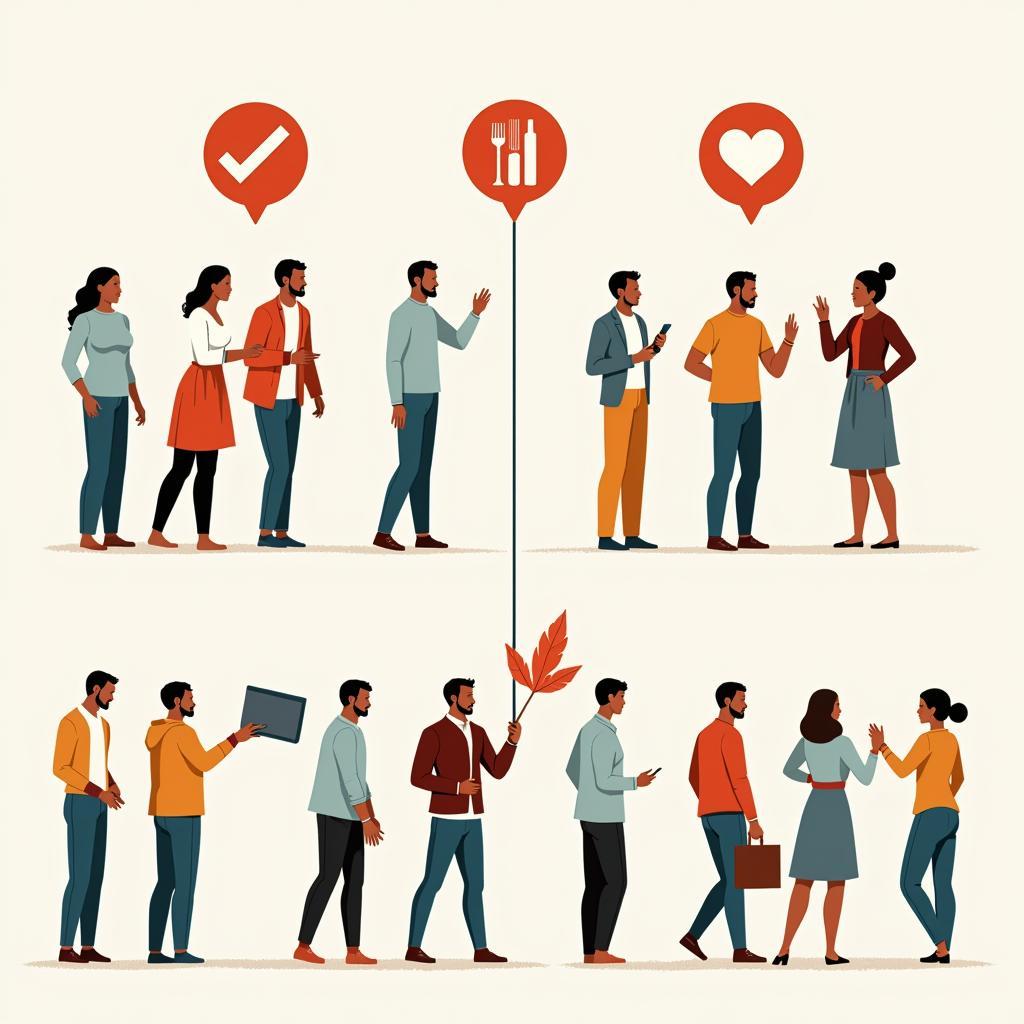Imagine a world without rules. Chaos would reign as people acted on their own desires, often at the expense of others. Enforceable rules of conduct are the invisible threads that hold a society together, fostering harmony and cooperation. These rules, often enshrined in laws and social norms, provide a framework for acceptable behavior and offer a means of resolving conflicts peacefully.
 Illustration of people following rules of conduct
Illustration of people following rules of conduct
What Makes Rules Enforceable?
The effectiveness of rules hinges on their enforceability. Simply put, a rule without consequences for breaking it becomes merely a suggestion. Several key factors contribute to the enforceability of rules:
- Clarity and Specificity: Rules must be clearly stated and easily understood by the members of society. Ambiguity can lead to misinterpretations and inconsistent application.
- Legitimacy and Acceptance: Rules are more likely to be followed if they are perceived as fair, just, and aligned with the values of the community.
- Effective Enforcement Mechanisms: There must be a system in place to monitor compliance, investigate violations, and impose proportionate consequences. This could range from informal social sanctions to formal legal proceedings.
The Role of Law in Enforcing Societal Rules
Laws are perhaps the most formalized and powerful expression of enforceable rules. They codify societal values and expectations, setting clear boundaries for acceptable behavior. Legal systems, through courts, law enforcement, and correctional institutions, provide a structured framework for investigating, prosecuting, and punishing those who violate these rules.
 Image of a courtroom representing the justice system
Image of a courtroom representing the justice system
For example, laws against theft deter individuals from taking the property of others, knowing that such actions could lead to arrest, trial, and potential imprisonment. This clear link between action and consequence acts as a powerful deterrent.
Beyond Law: The Power of Social Norms
While laws play a crucial role, they are not the only force shaping our behavior. Social norms, unwritten rules of conduct, exert a powerful influence on our daily interactions. These norms vary across cultures and communities, encompassing everything from common courtesy and dress codes to taboos and traditions.
Social norms often operate subtly, influencing our choices through the unspoken expectations of those around us. Violating these norms might not lead to legal repercussions, but it can result in social consequences like disapproval, ostracism, or damage to one’s reputation.
Consider the simple act of standing in line. There’s rarely a written law dictating this behavior, yet most of us adhere to this unspoken rule, understanding that cutting in line is disrespectful and likely to elicit negative reactions from others.
Enforceable Rules: A Balancing Act
While enforceable rules are essential for a functional society, it’s crucial to strike a balance between order and individual freedom. Overly restrictive rules can stifle creativity, innovation, and personal expression. On the other hand, a lack of clear and consistent enforcement can lead to a sense of lawlessness and erode social trust.
 People discussing ethics and societal rules in a community setting
People discussing ethics and societal rules in a community setting
Open dialogue, critical thinking, and a willingness to adapt rules to evolving societal values are essential for ensuring that these rules continue to serve their purpose: to foster a just, harmonious, and thriving society for all.
FAQ about Enforceable Rules of Conduct in a Society
- Q: Are all rules written down?
- A: No, many rules are unwritten social norms that vary across cultures and communities.
- Q: Who decides what rules are enforced?
- A: In democratic societies, laws are typically created and enforced by elected representatives. Social norms evolve more organically through shared values and expectations.
- Q: What happens if a rule is no longer effective?
- A: Societies can adapt and change rules over time through legislative processes or shifts in social norms.
Need Help?
If you are facing challenges related to conflict resolution, understanding legal rights, or navigating social norms, please reach out. You can contact us at:
Phone: 02043854663
Email: [email protected]
Address: Khu 34, Bac Giang, 260000, Vietnam
Our team is available 24/7 to provide support and guidance.